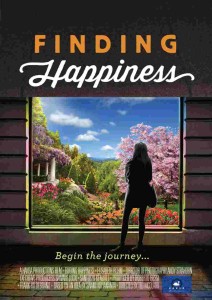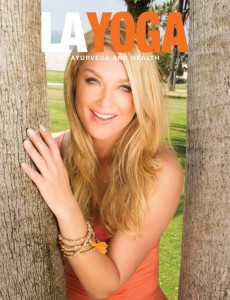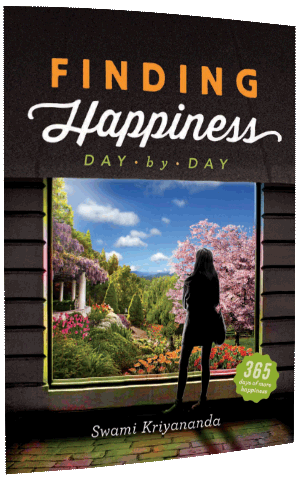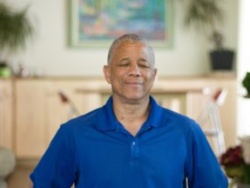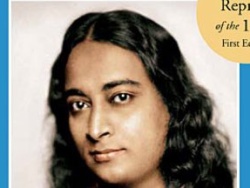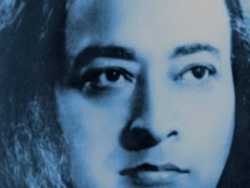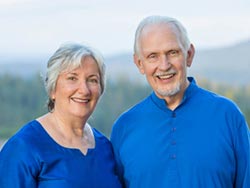UNIQUE AND JOYFUL LIFESTYLES ARE INSPIRATIONAL CORE OF NEW “FINDING HAPPINESS” FILM
Actress, Elisabeth Röhm from Law & Order, Heros and The Client List has a new film coming out this September called “Finding Happiness”.
Illuminating a joyful life that seems a distant dream to most people, the new film Finding Happiness reveals productive lifestyles filled with peace, harmony, compassion and love. The inspiring film shows us what is possible as we glimpse into the lives of hundreds of fulfilled people living in an enlightened community called Ananda Village in Northern California, one of nine such communities worldwide.
A fictional storyline serves as the framework for the community to share their experiences including virtually all aspects of their life. The community’s founder and spiritual leader, Swami Kriyananda, a direct disciple of Indian yoga master Paramhansa Yogananda for 65 years, is interviewed by the skeptical New York-based journalist, Juliet, assigned to write a magazine article about this “unique” community. Portrayed by Elisabeth Rohm (Miss Congeniality 2: Armed and Dangerous, Law & Order), Juliet interviews Kriyananda and learns of his life-long dedication to developing a spiritual, non-religious environment where people genuinely care about each other. He guides her to speak with various residents to learn of their experiences. The community lives together in separate housing, brought together with two underlying principles — first, that people are more important than things, and secondly, that acting justly, and for the highest good of ourselves and others, brings inner fulfillment and success in all endeavors.
As Finding Happiness makes abundantly clear, these principles are supported by a sustainable economic infrastructure of Ananda-owned and private businesses such as the Expanding Light Meditation Retreat – where people visit from all over the world to learn yoga and meditation – as well as schools for children, the Ananda College, agricultural endeavors and a publishing company, among others.
This uplifting environment is all within a beautiful 1,000-acre site in the Sierra Nevada foothills outside of Nevada City, California. This spirituality also infuses a global network of other satellite communities throughout the world — India (New Delhi), Italy (Assisi), Los Angeles, Palo Alto and Sacramento, and Seattle and Portland.
In the film, Juliet’s initial cynicism recedes as she is exposed to more people who radiate positive energy, inner strength and strong sense of wellbeing. Juliet interviews a diverse mix of residents, including families, teachers, medical and environmental experts, the younger generation, and many others.
Kriyananda (born J. Donald Walters) traces the origins of Ananda to his childhood dreams of utopian communities, which came alive when he became a disciple of Paramhansa Yogananda (in the film, Yogananda is portrayed by his grand-nephew, Sujon Datta). Kriyananda has become recognized, through his life of service to humanity, as one of the foremost spiritual teachers and has written more than 150 books and 400 songs.
Kriyananda warmly tells Juliet of his realization that a community could thrive stemming in part from Yogananda’s teachings and his own beliefs that “a few people with strong ideals can change the world” and that we all “live to be happy,” a state that comes from inside a person. In fact, the word “Ananda” means joy. He was further guided by his devotion to “simple living and high-minded thinking” and bringing spirituality into daily life. In 1967, he purchased the first parcel of land for this spiritual community, surrounded in his words by “the vastness of nature” with which they could live and build in “conscious harmony.”
After spending time at the Village, Juliet addresses the community, telling them that she is not only inspired, but is a changed person and determined to be more open to life. She asks for, and receives, a blessing from Kriyananda before returning to her busy urban-centered life, renewed in spirit, rejecting cynicism and guided by the principle to “live to be happy.”
Finding Happiness is produced by Hansa Productions; directed by Ted Nicolaou; produced by Roberto Bessi; executive produced by Shivani Lucki and Santoshi Nancy Kendall. More information about Finding Happiness or the Ananda organization can be found on this website: findinghappinessmovie.com
 The film Finding Happiness is a beautiful invitation to the Ananda spiritual community, wrapped lightly in the framework of a story. Of primary interest is the character J. Donald Waters, aka Swami Kriyananda, recently deceased founder of the Ananda movement worldwide, as himself. The film is set in the context of a skeptical investigative reporter’s visit to Ananda Village in Northern California’s Gold Country. There the reporter (Juliet Palmer, played by Elisabeth Rohm) discovers the benefits of living in a spiritual community. And this may be the most important element in giving the film the possibility of a wider audience: the idea of living in community.
The film Finding Happiness is a beautiful invitation to the Ananda spiritual community, wrapped lightly in the framework of a story. Of primary interest is the character J. Donald Waters, aka Swami Kriyananda, recently deceased founder of the Ananda movement worldwide, as himself. The film is set in the context of a skeptical investigative reporter’s visit to Ananda Village in Northern California’s Gold Country. There the reporter (Juliet Palmer, played by Elisabeth Rohm) discovers the benefits of living in a spiritual community. And this may be the most important element in giving the film the possibility of a wider audience: the idea of living in community.
As our dependence on technology has increased, we’ve become more alienated from the earth and from each other. Ananda Village offers the opportunity to live with caring, like-minded people in a beautiful, natural setting, which may be especially appealing to the Boomer generation that made going “back to the land” a national trend…
It’s not surprising to learn the original land was purchased along with Buddhist teacher Richard Baker, but who knew poets Alan Ginsburg and Gary Snyder were part of the deal? Snyder later writes, ““Nature is not a place to visit. It is home.” And indeed, this home in nature, shared with a like-minded spiritual community, is very appealing…
One of Kriyananda’s stated goals was to “provide the world an example of living harmoniously.” He believed that “a small intentional community will change the face of the world.” That instead of trying to change the world, we “become the world.” Whether or not Ananda Village achieves all of his lofty goals, it is certainly inspirational and for some, a way of finding happiness.
Abigail Lewis
New Spirit Journal
By Krysta Gibson
www.newspiritjournal.com
An investigative journalist named Juliet (Elisabeth Rohm) works for a New York Magazine Profiles. Her boss has learned of a spiritual community in California and sends her there to write a feature piece about this place called Ananda. Although not very excited about the idea, Juliet follows orders.
We witness her visit as she meets and interviews the community’s founder, Swami Kriyananda, and many of the people who live and work there. We learn about the concepts of community and how communities could be the answer to many of the world’s current challenges. Built on principles taught by Paramhansa Yogananda, author of Autobiography of a Yogi who lived and worked in America from the early 1920s to 1951, these concepts are woven into the fabric of the movie.
The ideas of simple living, high-minded thinking, the concept that people are more important than things, and that people can live together in harmony are all put forth in believable ways, believable because this is actually happening at Ananda.
Truly this could be called a docu-drama because only two of the people featured in the movie are actors: Juliet and her boss. The rest of the cast are played by themselves, people who have lived at Ananda many years, some since its beginning in the late 1960’s.
The movie is educational but also very inspirational and moving. One can only hope that the Ananda community is ready for the hordes of people who will be showing up at their doorstep, people who want what this movie shows is possible: a life of happiness and fulfillment right now in today’s world.
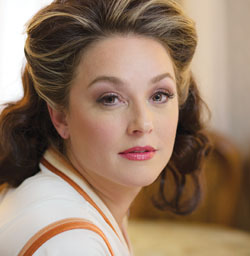 Hustle’ and ‘Happiness’: Venice-based actress Elisabeth Röhm is making her mark on Hollywood
Hustle’ and ‘Happiness’: Venice-based actress Elisabeth Röhm is making her mark on HollywoodBy Michael Aushenker
You could say actress Elisabeth Röhm really is “Finding Happiness.”
At 40, the Venice resident and former “Law & Order” cast member is quietly cultivating a substantial movie career that will include a part in the much-anticipated “American Hustle” — director David O. Russell’s follow-up to the Academy Award-winning “Silver Linings Playbook” — and a starring role in the new independent film “Finding Happiness,” which screens tonight at Laemmle’s Monica 4-Plex in Santa Monica.
Directed by Mar Vista resident Ted Nicolaou, “Finding Happiness” stars Röhm as a journalist interloper in the real-life Ananda commune near Grass Valley in Northern California. Through Röhm’s character, the film explores the community’s method of dealing with “death and dying, gardening, solar technology, how they sustain,” said Nicolaou.
For Röhm, the subject was intriguing.
“It interested me people living in a simpler manner,” she said. “These are high-minded people; it wasn’t just a bunch of hippies.”
And for Nicolaou, it was in part Röhm’s openness to the experience that made her right for the role.
“I sort of made [the film] like a self-portrait of the community and put her in my shoes. I knew nothing about this community. I don’t consider myself a spiritual person, but a magical-thinking former hippie. [Ananda] really challenged my feelings about how I lived my life — about being kind, giving, service. I came away from it more open-minded” Nicolaou said.
“Elisabeth is a really smart, very gentle and really dedicated actress who likes to enjoy herself. She basically embraced her experience at Ananda and really lived there while we [did the film],” he continued.
Initially, “Finding Happiness” was imagined as a documentary until producer Roberto Bessi suggested a central character — Juliette, Röhm’s fictional journalist — whose evolution viewers could follow through the film.
Röhm came to Nicolaou’s attention through a casting director who had learned meditation from Röhm’s late mother, Lisa Loverde.
Nicolaou met the actress at Venice Grind, a local coffeehouse.
“This was going to be a spiritual journey,” Nicolaou said. “It was obvious she could play skeptical [reporter] Juliette but also be so open to the people of Ananda.”
A seasoned television actress, Röhm already had experience on daytime soap operas such as “One Life to Live” and had played on “Law & Order,” “Heroes,” and “The Mentalist.” As part of the “Law & Order” cast, she was nominated in 2001 and 2003 for the Screen Actors Guild Award for Outstanding Performance by an Ensemble in a Drama Series.
Also no stranger to the kind of attention celebrity brings, Röhm landed on Maxim magazine’s “Hot 100” list in 2002.
But “Finding Happiness” presented a different kind of challenge.
Interacting with Ananda residents, “There was a lot of improvising,” Röhm said. “It’s certainly not like a traditional acting job.”
Röhm made residents of the self-sustaining community “feel calm and comfortable,” Nicolaou said.
The upcoming “American Hustle” — which reunites Russell with Bradley Cooper and Jennifer Lawrence as well as Christian Bale, star of Russell’s 2010 film “The Fighter” — is the next milestone in the German-born actress’s transition to the silver screen.
Röhm said she can hardly wait for the film’s December release.
“It was the most spontaneous and crafted dynamic experience of my career,” Röhm said.
“[Russell’s] a certifiable genius,” she continued. “He’s compassionate and touches a very deep cord in our human experience. He really gets to a heart of family.”
Röhm shot “American Hustle” in Boston but said her heart remains in Venice.
“It reminds me of the best of a lot of different worlds,” she said. “It’s eclectic: Dogtown, Abbot Kinney, the canals, suburbia — the transition happening like what happened in SoHo. It’s an artistic community that remains pure.”
In trying to capture a pure essence of the Ananda community, Nicolaou stressed that he was careful not to impose any judgment or bias on the community but to let moviegoers decide for themselves.
“I tried to stay out of the way,” he said. “Once you meet the people of Ananda, you are disarmed and you don’t want to mock them. They are earnest, and they’ve kept at it for 50 years.”
As it was for Röhm, the film was also a departure for Nicolaou, who previously shot low-budget vampire movies in Transylvania, children’s fantasy films and bonus-feature documentaries for Disney DVDs.
“Finding Happiness” is “not an infomercial, but an honest portrait of the people of the community,” he said. “If you’re listening to what the people are saying, it’s fascinating.”
A special screening of “Finding Happiness” takes place Thursday, Nov. 14 at 7:30 p.m. at Laemmle’s Monica 4-Plex, 1332 2nd St., Santa Monica. A Q&A session with Röhm and Nicolaou will follow the screening.
Michael@argonautnews.com
Note: American Hustle is now nominated for BEST PICTURE at the Oscar Awards, as well as Best Director, Best Actress, Best Actor, Best Supporting Actress, Best Supporting Actor.
An inspirational, new-trend film with Elisabeth Rohm as the fictional journalist, and the members of the Ananda community playing themselves.
Where can we get more happiness?
Sages of all traditions and times have asked that question. They tell us we’ve been given five tools for the journey: body, feelings, will, mind, and soul. When people use their Happiness Tools wisely, in ways that increase health, love, strength, wisdom, and joy, their smiles grow wider.
When they narrow their awareness, becoming selfish and self-involved, they grow ill and unhappy.
It’s an ancient and timeless formula that will never go away, because it’s rooted in human nature:
Expanding awareness = happiness. Contracting awareness = the Blues.
Now imagine a small town where the people know this simple formula,. They’re intent on practicing it themselves and supporting one another in their common quest.
Let’s give our new town a fanciful name – we’ll call it Ananda, a Sanskrit word that means Bliss. (Anandamide is name scientists gave the “endogenous cannabinoid neurotransmitter” that makes us blissful when we eat chocolate.)
We’ll buy a Gold Rush-era farm in the foothills, 80 miles from Chico, and we’ll begin our happiness experiment. And if we’re successful, perhaps 45 years later we’ll make an inspiring film about our long and happy experiment (now our happiness experience) – to show the world that the eternal bliss-formula still works today.
That’s the story behind Finding Happiness, an inspiring new film starring Elisabeth Rohm (Law & Order, The Client List, Heroes, CSI: Miami, American Hustle).
Rohm plays Juliet Palmer, a fictional magazine journalist in New York City whose editor assigns her to write an investigative piece about Ananda. Founded in 1968 on a 67-acre parcel, acquired as part of a group purchase with iconic counterculture poet Gary Snyder and Zen Roshi Richard Baker, Ananda now has 200 residents who live, work, and raise families on 1000 acres, about 12 miles north of Nevada City
Finding Happiness is somewhere in the ballpark of a docudrama, but not quite – it’s a visually rich travelogue that follows Juliet’s encounters with the real-life Ananda members – an idiosyncratic bunch of young and old organic farmers, solar engineers, software developers, environmental scientists, Web designers, mothers, doctors, architects, nature guides, and writers – whose unscripted words and happy smiles tell the story. Included is some of the last-filmed footage of Ananda’s visionary founder, Swami Kriyanada, who left the body at age 87 in April 2013.
It’s a stunningly inspiring movie, and a highly enjoyable theater experience – for its soaring music, interesting people, and wonderful visuals. Probe deeper, and the subtle message of Ananda is clear: the secret of Finding Happiness is the same now as in ancient times.
The words of a song by Swami Kriyananda, express that secret: “Though words and customs vary, like waves upon the sea, one life beneath the surface binds everyone to me. Who knows himself knows all men as brothers.”
Highly recommended. Finding Happiness is coming soon to Chico.
 FINDING HAPPINESS: A Place Called Ananda
FINDING HAPPINESS: A Place Called Ananda
By Erica Roberts
[Hansa Productions, 2013, 1 hr 35 minutes]
Finding Happiness: A Place Called Ananda is a film that effortlessly combines fact and fiction. Its main character is a cynical journalist from Manhattan, Juliet, who is sent out to visit and write about Ananda Village, a multi-denominational spiritual community based on the ideals of Indian yogi and guru Paramahansa Yogananda that is located near Nevada City, California,. While Juliet and her boss are fictional, the community and its featured members are real, and their activities are showcased in a way that directly reflects reality.
At first Juliet is skeptical about visiting the Ananda community, but after meeting the members, learning yoga and meditation getting back to nature, she forgets about life back in New York City for a few days. As the Ananda members meet Juliet, we get to hear from some of the community’s most insightful and well-spoken members, including the late Swami Kriyananda, who founded the featured Ananda community (the first one ever), nearly 50 years ago. As Juliet interacts with Swami and the others, it’s easy to see the transformation within her. She begins to soften and relax and at the end of her stay, she says she would like to return to Ananda Village again someday.
Urbanites can identify with Juliet, drawing them into Ananda’s story. “If I’m not back in a week, come and get me,” she says, skeptical about her visit, which director Ted Nicolaou says symbolizes exactly how a typical, non-spiritual person from the West would react to this kind of venture.
Nicolaou understood the need for the film to be presented in the way that it eventually was. Originally, Kriyananda had written a script, but Ted wanted to take a documentary approach. Finally, after realizing it was best to let the people of Ananda speak candidly, with some guidelines, they settled on using the unconventional hybrid of fiction and reality.
The creation of Finding Happiness was not a speedy process. Executive producer Shivani Lucki says there were three and a half years between the time Kriyananda was inspired with the idea and the time when the film was finally completed. However, it was an enjoyable process for all. A process that, according to Shivani, was driven by grace. She believes grace got her through her own role, as she had no prior filmmaking experience, and grace also led the Ananda community to the best collaborators. One of these was the aforementioned Ted Nicolaou. His friend Roberto Bessi, who produced the film and originally contacted him about working on it, knew he was compassionate and peaceful enough to work with the people of Ananda.
Ted and Roberto – Ananda movie Finding Happiness
Ted Nicolaou, Director (left), and Roberto Bessi, Producer (right).
Ananda was also led to Elisabeth Röhm, the actress playing Juliet. In a synchronous twist, the first agent whom Shivani and her associates spoke to offered to put the crew in contact with Elisabeth. She confidently told them there was no one else who could play the role as well as she could, so she was given the job. She had grown up in a spiritual environment, spending a lot of time in ashrams because her mother was involved with transcendental meditation, and she wanted to get back to her roots. But since she had been away from spiritual communities for quite a long time, she entered the California village unaccustomed to community life, just as Juliet did. She stayed at Ananda throughout the filming and went through a similar transformation to her character.
The combination of fiction and reality worked so well because the majority of the people involved in the film are Ananda members or are sympathetic to their ideals. If the people of Ananda had been forced to work with a director and a lead actress who did not understand them at all, it’s doubtful that the real story of the community would have been portrayed as effectively as it was. Lucki says Nicolaou was the ideal choice for a director. “He got it. He got the beauty and the simplicity and the genuineness of our life, and I think he really captured it.” As for the transitions between fact and fiction, those flowed so nicely since there was always a thread of Elisabeth’s real experience, having returned to a spiritual community after living in Los Angeles, within each fictional scene.
As well as being authentic, the film itself manages to maintain a light, slightly humorous tone unlike many documentaries that end up boring audiences because their approaches are too serious and cerebral. The interspersing of fictional elements along with some humour present a relatable context that keeps viewers interested and entertained.
LA Yoga Magazine: Finding Happiness the Film
The 2013 film, Finding Happiness, tells the story of investigative journalist Juliet Palmer, portrayed by Elisabeth Rohm. Juliet, who specializes in exposing corruption, reluctantly travels to Aananda World Brotherhood Village in Northern California to interview its visionary founder.
Through a series of interviews with many of the residents, she learns about the inner workings of the spiritual community, and begins to awaken to yogic philosophy and concepts. As she applies them to her own life, she receives guidance from the extraordinary (now deceased) Swami Kriyananda. His gentle wisdom leads her to the path of her own spiritual transformation. For Juliet, what begins as an investigation into idealism and alternative lifestyle becomes an unexpected awakening and discovery of the self.
Finding Happiness is an elegant blend of fiction and non-fiction. The framework in which writer and director Ted Nicolaou sets up the film delivers factual and historical context and a deeply moving story. The interviews are authentic and inquisitive and provide a fertile landscape for both societal and personal transformation.
FindingHappinessMovie.com

Finding Happiness
A film that brings a new perspective to docudrama, Finding Happiness presents real people living dynamic, harmonious lives in real communities around the world, viewed through the eyes of fictional magazine journalist, Juliet Palmer (Elisabeth Rohm, Law and Order, Heroes, American Hustle). A somewhat skeptical and jaded Juliet meets extraordinary people who not only answer her questions, but welcome her to a reality she had never imagined — founded on inner happiness and freedom. Filmed on location at the Ananda communities in California, Italy and India.
As Juliet researches Ananda, an inspiring self-portrait of the community emerges. We meet a group of people who have made the personal journey from idealism to inner transformation, and who have developed practical solutions for a sustainable, harmonious, inwardly fulfilling way of life. In her interviews, especially those with the founder, Swami Kriyananda, she finds answers for her personal quest. His gentle wisdom helps her discover eternal truths with the power to transform her life.
The reporter is fiction, the place is fact. A remarkable journey to a place where happiness lives — and how we may re-awaken it in our own lives, wherever we may be.
Editor Review by Miriam Knight
Finding Happiness offers a soul-soothing contrast to the relentless litany of disasters that makes up our media diet. This docudrama seamlessly blends a fictional storyline, beautifully portrayed by the luminous Elisabeth Rohm, with conversations with real members of Ananda communities, its spiritual leader, Swami Kriyananda, as well as pictures, footage and recreations of events in the history of the movement.
Dozens of experiments in utopian communal living have come and gone in the last century, foundering on the rocks of the darker side of human nature and often the ego of its leaders. While Kriyananda’s life has not been without controversy, it seems very clear that his intention has always been to carry out the vision of his guru, Paramahansa Yogananda, by establishing intentional communities around the world. The film focuses on the community members as they live their lives bridging the ideals of the village with the practicalities of the wider world. Swami Kriyananda died shortly after being interviewed for the film, which offers hope that this particular utopian endeavor will outlive its spiritual leader, and indeed be his legacy.
Swami Kriyananda states several times in the film his belief that the answer to the toll that the urban/consumer lifestyle takes on the human spirit – indeed the future of human civilization is to be found in intentional communities where people come together on the land, in service to a higher truth and the greater good. The picture painted by the film of life in the California Ananda community is so idyllic that a cynic might wonder if it is too good to be true. Interviews with multigenerational families, however, give one the hope that they have created a viable alternative that could serve as a model for other such communities.
Based on the teachings of Yogananda, the community’s spiritual practices revolve around service to others, meditation, yoga, and living in harmony with each other and with the land. At one point Kriyananda was asked if that was enough or if one had to believe in God. He paused, and said he thinks that it helps. When you see the joy that radiates from the faces of the community members, young and old, you do get the feeling that they are on to something. Does it stem from connection to God, nature, healthy living, being surrounded by friends, or all of the above? Above all, is it replicable? It’s hard to say, but watching this film makes one really hope so.
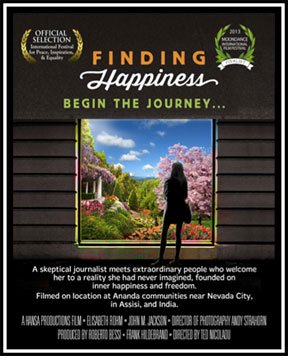 “Finding Happiness” Documentary at Unity of Sedona: Sedona.Biz
“Finding Happiness” Documentary at Unity of Sedona: Sedona.Biz
Filmed on location at the Ananda communities in California, Italy, and India, Finding Happiness follows a young woman as she spends a week with the residents of Ananda, who answer her questions and welcome her to a reality she had never imagined possible.
We meet a group of people who, in their own unscripted words, have journeyed from idealism, to inner transformation, using practical, viable solutions for a sustainable, harmonious, fulfilling way of life. In talking with the residents and especially those with Kriyananda, she comes face-to-face with her own odyssey through life and her own quest for happiness. His answers lead her to discover not only the facts about the community, but the universal truths that hold the power to transform her own life.
The story has its origins in the 1920s when yoga arrived on America’s shores in the person of Paramhansa Yogananda, whose book Autobiography of a Yogi is the best-read autobiography of all time. Yogananda’s mission included two key points that powerfully influenced his young disciple, J. Donald Walters, later renowned as Swami Kriyananda. First, personal change starts within. Second, our environment greatly influences our search for happiness. Yogananda envisioned places where people could put high principles into action – “world brotherhood colonies,” he called them. In 1968, Swami Kriyananda founded the first community near Nevada City, California, in the beautiful foothills of the Sierra Nevada.
Read Article at Sedona.biz here
New Connexion Journal
by Vicky Thompson
Finding Happiness is a beautiful meditation on the achievements of the Ananda movement to build sustainable intentional communities worldwide. Filmed at Ananda Village in the Sierra Nevada foothills of northern California as well as at Ananda Europa (Italy) and Ananda India, the documentary weaves reality with fiction in the tale of a journalist (played by Elisabeth Rohm of Law and Order and American Hustle), tasked with finding the real story behind the community. Visually stunning, the film captures the peaceful beauty of Ananda Village, offering a vicarious view into the daily lives of people committed to conscious living.
Ananda was founded nearly 50 years ago by the late Swami Kriyananda, who lived with Paramhansa Yogananda (author of Autobiography of a Yogi), and later assumed the lead role in developing communities where “people are more important than things.” More than 1,000 people live in Ananda communities worldwide, including Portland and Seattle. Finding Happiness also features some of the last interviews with Kriyananda, who shares his passion for service through stories filled with gentle humor and emotionally moving moments. Finding Happiness leaves you feeling calm and uplifted, and your belief in the evolution of humanity restored.”
Review By Stephen Sturgess
Right from the beginning this beautiful sincere and joyful film ‘Finding Happiness’ absorbs your attention and warms your heart. Happiness has the powers of peace and love merged within it, and these qualities come through abundantly in this film.
The film is very professionally directed and produced. The scenery and genuine joyful Ananda devotees make the photography of this film visually very attractive to watch.
The film has a good balance of everyday life at the Ananda Village, concepts of Yoga and meditation philosophy, and how to live a balanced spiritual life in harmony and peace with others, with God and Nature.
By the end of watching this film one is left with the feeling of having witnessed what true happiness really is and how it can be attained by opening your heart to God, because when there is this experience, you restore your connection to an everlasting ocean of love and happiness, and then you will realise this is your own essential nature, it was what you were always searching for.
Stephen Sturgess, author of: The Yoga Book, Yoga Meditation, The Book of Chakras and the Subtle Bodies, The supreme Art and Science of Raja & Kriya Yoga.





